Chinese people created a splendid history of Chinese literature. There are four major genres of Chinese literature, including poem, prose, drama, and novel. Since the first poem collection of the Book of Ode containing the poems from 11th century BCE to 6th century BCE, the Chinese people created numerous poems that reflected the societies at different times. In terms of drama, Yuan Dynasty Drama is the representation of the highest Chinese drama achievement. While the Chinese prose was developed as a significant part of Chinese literature all along. Lastly, the four great novels represented the highest level of novel writing achievement in imperial times of China. In modern times, there were more novelists and essayists.
Quick Facts about Chinese Literature
The Four Great Classical Novels of Chinese Literature are Water Margin (水浒传), Romance of the Three Kingdoms (三国演义), Journey to the West (西游记), and Dream of the Red Chamber (红楼梦).
The Five Classics include the Book of Odes (诗经), Book of Documents (尚书), Book of Changes(周易), Book of Rites(礼记), and the Spring and Autumn Annals(春秋).
The Four Books are comprised of the Doctrine of the Mean(中庸), 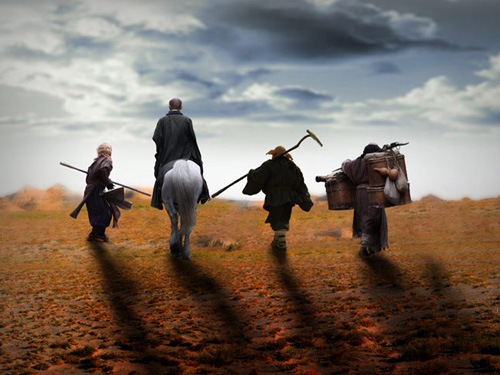 the Great Learning(大学), Mencius(孟子), and the Analects(论语).
The oldest book in China is the Book of Changes.
It was Qu Yuan (c. 340-278 BCE) who invented the Chinese poem.
Book of Documents (尚书) is the first book of prose in China.
Book of Odes (诗经) is the first poetry collection in China.
Analects(论语) is the holy book of Confucianism.
Tao Te Ching (道德经) is the holy book of Taoism.
the Great Learning(大学), Mencius(孟子), and the Analects(论语).
The oldest book in China is the Book of Changes.
It was Qu Yuan (c. 340-278 BCE) who invented the Chinese poem.
Book of Documents (尚书) is the first book of prose in China.
Book of Odes (诗经) is the first poetry collection in China.
Analects(论语) is the holy book of Confucianism.
Tao Te Ching (道德经) is the holy book of Taoism.
History of Chinese Literature
Slavery Society (2070 c- 771 BCE)
Xia, Shang, Zhou, and Spring and Autumn Period are the sprouting ages of Chinese literature. Book of Odes, the first poetry collection in Chinese literature, collects 305 poems from the early Western Zhou Dynasty to the middle ages of the Spring and Autumn Period. According to the usage and the music, the poems can be divided into "Feng", "Ya" and "Song" three parts. "Feng" refers to the folk songs from different regions, "Ya" refers to the imperial poems mostly sung by the upper class, and "Song" refers to the dancing music for the sacrificial purpose among Zhou Dynasty kings and dukes.
The Prose of Pre-qin Philosophers in the Spring and Autumn Period and the Warring States Period (770 - 221 BCE)
Confucianism
Analects, one of the classics of Confucianism is 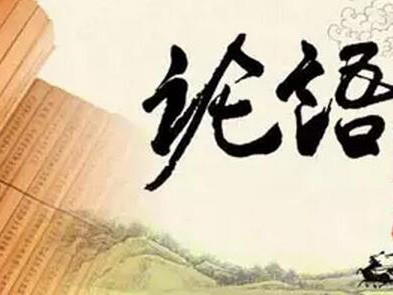 a book of quotations and dialogues compiled by disciples and next-generation disciples of Confucian to record Confucian's political opinions, theoretical thoughts, moral concepts, and education principles. It's also one of five classics that scholars in later generations must study.
Mencius is a book that records the theories and political ideas of Mencius, who was also a great saint of Confucianism after Confucian.
a book of quotations and dialogues compiled by disciples and next-generation disciples of Confucian to record Confucian's political opinions, theoretical thoughts, moral concepts, and education principles. It's also one of five classics that scholars in later generations must study.
Mencius is a book that records the theories and political ideas of Mencius, who was also a great saint of Confucianism after Confucian.
Lao-Zhuang Philosophy
Zhuangzi was the representative of Lao-Zhuang philosophy in Spring and Autumn and the Warring States Periods. He wrote the romantic prose of Carefree Journey and Dismember An Ox As Skillfully As A Butcher.
Legalist School
Xunzi was an ideologist in the late Warring States Period. He believed that people were born bad and his proses were mostly long, for example, the article To Encourage Learning.
Songs of Chu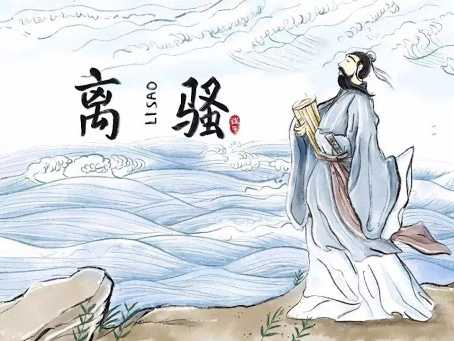
Sorrow After Departure (离骚) is the longest political lyric poetry in ancient China. It’s written by the first patriotic poet Qu Yuan. The Nine Songs (九章) and A Request to God (天问) were also from Qu Yuan.
Other Important Literature Works
1.Mister Lv's Spring and Autumn Annals (吕氏春秋) compiled by Lv Buwei and his hangers-on.
2.Military Science of Sun Zi (孙子兵法), the earliest book of war, written by Sunzi.
3.Chronicle of Zuo (左传), the book of historical wars and battles by Zuo Qiuming.
4.Book Guoyu, the first history book in national style.
5.Strategies of the Warring States that involved in the struggles  and counsels of the warlords and strategists in the Warring States Period, compiled by Liu Xiang from the Western Han Dynasty.
and counsels of the warlords and strategists in the Warring States Period, compiled by Liu Xiang from the Western Han Dynasty.
Chinese Literature in Qin and Han Dynasties (221 B.C - 220 A.D)
Qin Dynasty: Remonstrance of Expelling the Foreign Officials by Li Si.
Han Dynasty: Fu and Yuefu Poetry (Folk-song-styled Verse) are the representative genres.
Author Work(s)
|
Author
|
Work(s)
|
|
Sima Qian
|
Historical Records (史记)
The first general history of China by chronology
|
|
Ban Gu
|
History of the Han Dynasty(汉书) A dynastic history book by chronology.
|
|
Jia Yi
|
Ten Crimes of Qin (过秦论), Mourn for Quyuan (吊屈原赋)
|
|
Wang Chong
|
Lun Heng (论衡)
|
|
Sima Xiangru
|
Shanglin Fu, Zixu Fu
|
|
Zhang Heng
|
Erjing Fu
|
|
Guo Maoqian
|
Han Yuefu Poetry Collection
|
|
|
Yuefu Poetry: Peacock Flies to the Southeast and The Song of Mulan
|
Chinese Literature in Wei and Jin Dynasties (220 - 589)
From Late Eastern Han to Wei Dynasties (196 - 265):
Three caos: Cao Cao (Turtles Live Long), 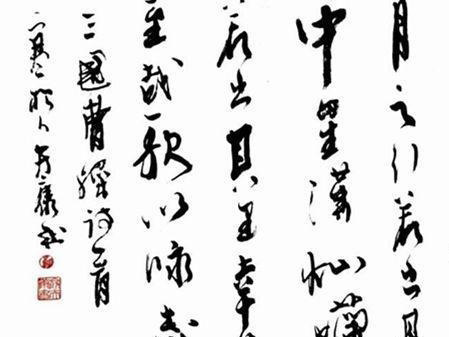 Cao Pei (Song of the Yan Country), and Cao Zhi (Ode to the Goddess of the Luo River).
Seven Writers from Jian’an Reign (196-220): Kong Rong, Chen Lin, Wang Can, Xu Gan, Ruan Yu, Ying Chang, and Liu Zhen.
Others like Cai Wenji wrote Hu Jia Shi Ba Pai and famous strategist Zhuge Liang wrote Northern Expedition Memorial.
Cao Pei (Song of the Yan Country), and Cao Zhi (Ode to the Goddess of the Luo River).
Seven Writers from Jian’an Reign (196-220): Kong Rong, Chen Lin, Wang Can, Xu Gan, Ruan Yu, Ying Chang, and Liu Zhen.
Others like Cai Wenji wrote Hu Jia Shi Ba Pai and famous strategist Zhuge Liang wrote Northern Expedition Memorial.
Wei and Jin Dynasties (265 - 420)
Seven Intellectuals in Bamboo Forest: Ji Kang, Ruan Ji, Ruan Xian, Shan Tao, Xiang Xiu, Wang Rong, and Liu Ling.
Chen Shou wrote The History of the Three Kingdoms
Tao Yuanming is the founder of pastoral poems.
Xie Lingyun: the founder of scenery poems.
Li Daoyuan compiled the prose Commentary on the Waterways Classic.
Literature in Tang Dynasty (618-907)
Poetry: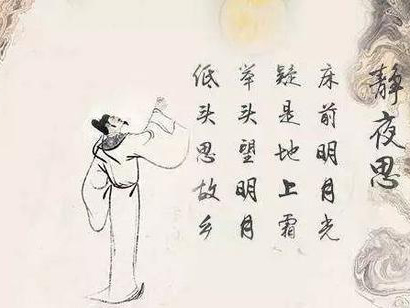
Four Outstanding Poets in the Early Tang Dynasty: Wang Bo, Luo Binwang, Yang Jiong, and Lu Zhaolin.
Pastoral Poets: Meng Haoran, Wang Wei.
Frontier Poets: Gaoshi, Cen Shen, Wang Changling, Wang Zhihuan, Wang Han
Other Famous Poets: Li Bai (the greatest romantic poet), Du Fu (the greatest realistic poet), Liu Changqing, Bai Juyi, Meng Jiao, Li Shen, Li Mu, Li Shangyin, Wen Tingjun, and many more.
Prose: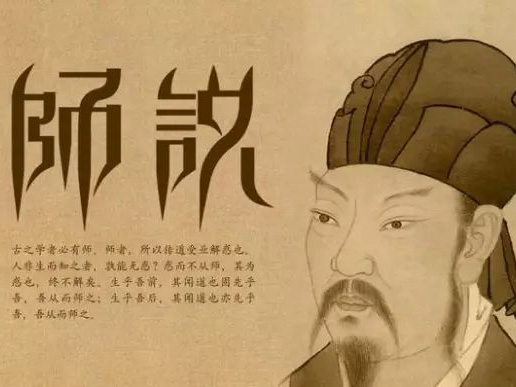
Hanyu: the animateur of Ancient-Style Prose Movement.
Liu Zongyuan: philosopher and litterateur.
Novel:
Tang Dynasty legend is a milestone of a Chinese classic novel. There are Tale of Liu Yi by Li Chaowei, Tale of Huo Xiaoyu by Jiang Fang, and Pillow Story by Shen Jiji.
Literature in the Song Dynasty (960 - 1279)
Song Dynasty Essayists:
Shu Xun: an essayist and political commentator.
Sima Guang: his book History as a Mirror was regarded as the only history book that can compete with Historical Records.
Shen Kuo: his Dream Pool Essays was praised as the milestone of Chinese science history.
Song Dynasty Poets: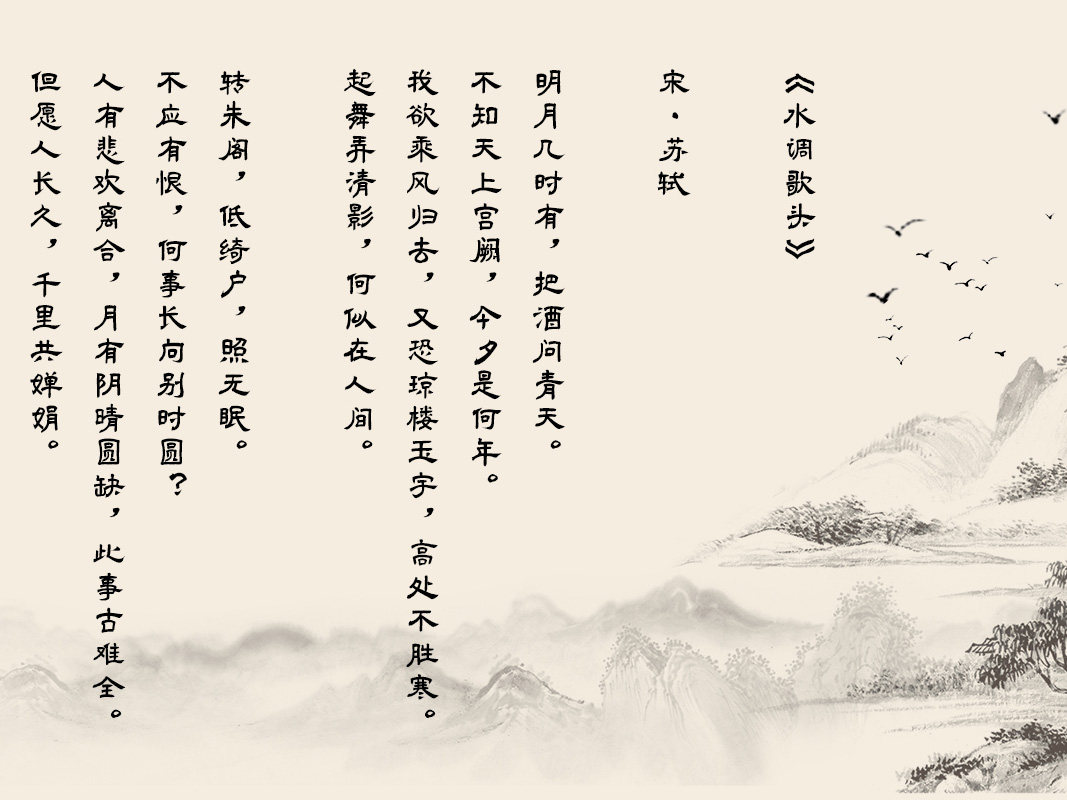
Shu Shi and Xin Qiji: the representative poets of bold and unconstrained poetry.
Liu Yong and Li Qingzhao: the representative poets of the graceful and restrained poetic genre.
Eight Great Scholars of Tang and Song Dynasty: Han Yu, Liu Zongyuan, Wang Anshi, Su Xun, Su Shi, Su Zhe, and Zeng Gong.
Other famous poets: Ouyang Xiu (also a calligrapher), Lu You, Wen Tianxiang, Yang Wanli, Zhu Xi, Zhou Dunyi, and Zheng Xie.
Yuan Dynasty Drama (1271 - 1368)
Dramatists and their works:
Guan Hanqin: representative dramatist of Yuan Drama and his 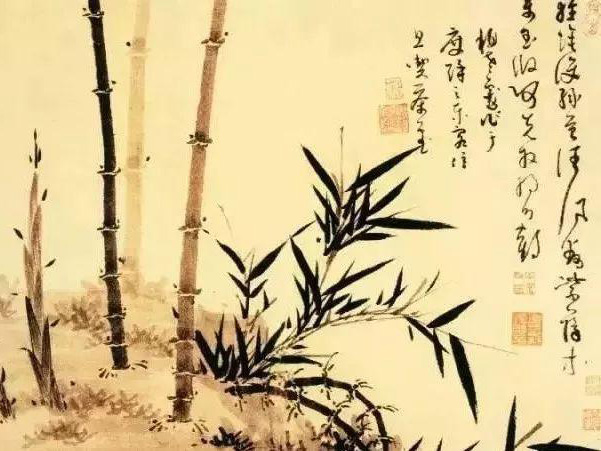 work includes Snow in Midsummer, Butterfly Dreaming, The Rescue of a Courtesan, River-viewing Lofty, and many more.
Wang Shipu: West Chamber.
Ma Zhiyuan: Sorrow in the Han Palace.
Zheng Guangzu: Beauty Lost Her Soul.
Bai Pu: Pei Shaojun And Li Qianjun.
work includes Snow in Midsummer, Butterfly Dreaming, The Rescue of a Courtesan, River-viewing Lofty, and many more.
Wang Shipu: West Chamber.
Ma Zhiyuan: Sorrow in the Han Palace.
Zheng Guangzu: Beauty Lost Her Soul.
Bai Pu: Pei Shaojun And Li Qianjun.
Southern Opera Scripts:
Gao Ming: The Story of Pipa.
Shi Hui: Obeisance Moon Cabin, The Romance of a Hairpin, The Tale of White Rabbit, and more.
Ming Dynasty Literature (1368 - 1644)
Novelists: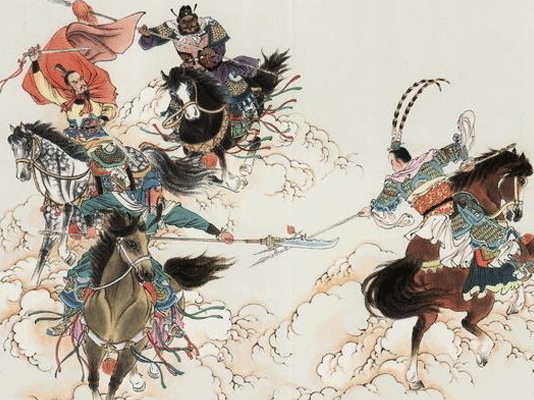
Luo Guanzhong: founder of Chinese chapter book; his work: Romance of the Three Kingdoms.
Shi Nai’en: Water Margin.
Wu Cheng’en: Journey to the West.
Xu Zhonglin: Investiture of the Gods.
Short Story Writers:
Feng Menglong: Illustrious Words to Instruct the World, Stories to Caution the World, and Stories to Awaken the World.
Ling Mengchu: Slapping the Table in Amazement and The Second Collection of Slapping the Table in Amazement.
Dramatists:
Tang Xianzu: Peony Pavilion, The Legend of Purple Hairpin, The Handan Dream, and The Tale of Nanke.
Essayists and Poets: Song Lian, Liu Ji, Zhang Fu, Gui Youguang, Xu Hongzu, and Yu Qian.
Qing Dynasty Literature (1644 - 1912)
Dramatists:
Hong Sheng: Palace of Eternal Life.
Kong Shangren: The Peach Blossom Fan.
Li Yu: Qing Zhong Pu.
Li Yu: Meet Someone at Leisure.
Novelists:
Pu Songling: Strange Stories from a Chinese Studio.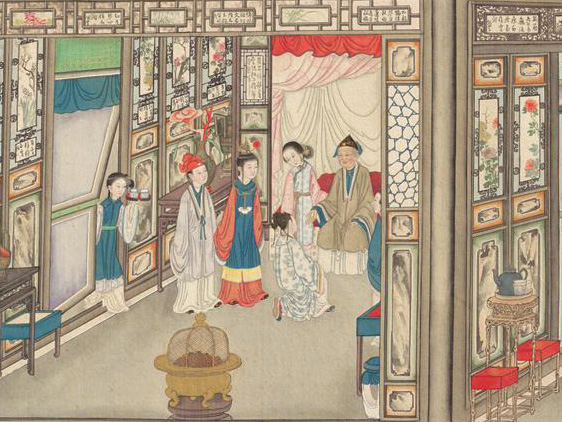 Li Ruzhen: The Marriage of Flowers in the Mirror.
Qian Cai and Jin Feng: Story of Yue Fei.
Wu Jingzi: Unofficial History of Officialdom.
Cao Xueqin: A Dream in Red Mansions.
Poets: Gu Yanwu, Wu Weiye.
Essayists: Tongcheng School prosers including Fang Bao, Yao Nai.
Li Ruzhen: The Marriage of Flowers in the Mirror.
Qian Cai and Jin Feng: Story of Yue Fei.
Wu Jingzi: Unofficial History of Officialdom.
Cao Xueqin: A Dream in Red Mansions.
Poets: Gu Yanwu, Wu Weiye.
Essayists: Tongcheng School prosers including Fang Bao, Yao Nai.
Modern Literature (1917 - 1949)
After the Xinhai Revolution, Chinese society entered modern times, and Chinese literature was greatly influenced by foreign culture. 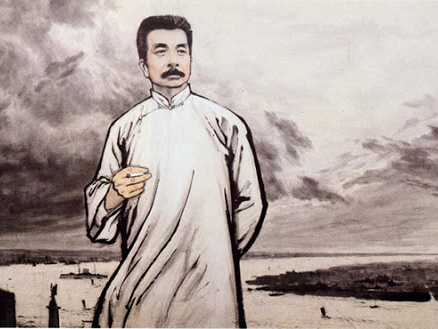 Many writers felt oppressed by the old Chinese traditions and customs and the imperialist threats from outside that they wrote a lot of novels to call people up to rebel. There were world-famous writers like Lu Xun (1881 - 1936) who wrote, A Madman's Diary, Call to Arms, Wandering, Life Is a Moment and more, Guo Moruo who wrote Goddess, Wen Yiduo who wrote Candle, Dead Water, Zhu Ziqing wrote Trace, Bing Xin who wrote Stars and Midnight Blue and Spring Water, Yu Dafu who wrote Falling, and many more. Many newspapers were established by scholars who strove to wake Chinese people from their fatuous ideas and embrace the revolution. Among them, Mao Dun, Ba Jin, Lao She, Zhang Tianyi, Qian Zhongshu, Xiao Jun, Xiao Hong, Zang Kejia, Cao Yu, Xia Yan, Ding Ling, He Jingzhi, and Ding Yi were some of the most famous essayists.
Many writers felt oppressed by the old Chinese traditions and customs and the imperialist threats from outside that they wrote a lot of novels to call people up to rebel. There were world-famous writers like Lu Xun (1881 - 1936) who wrote, A Madman's Diary, Call to Arms, Wandering, Life Is a Moment and more, Guo Moruo who wrote Goddess, Wen Yiduo who wrote Candle, Dead Water, Zhu Ziqing wrote Trace, Bing Xin who wrote Stars and Midnight Blue and Spring Water, Yu Dafu who wrote Falling, and many more. Many newspapers were established by scholars who strove to wake Chinese people from their fatuous ideas and embrace the revolution. Among them, Mao Dun, Ba Jin, Lao She, Zhang Tianyi, Qian Zhongshu, Xiao Jun, Xiao Hong, Zang Kejia, Cao Yu, Xia Yan, Ding Ling, He Jingzhi, and Ding Yi were some of the most famous essayists.
Contemporary Literature (1949 - 21th century)
Contemporary literature refers to the literary works created after the founding of the People’s Republic of China. Most of them are novels, for example, Chronicle of a Blood Merchant by Yu Hua, Big Breasts and Wide Hips by Mo Yan, Qin Opera by Jia Pingwa, Feathers Everywhere by Liu Zhenyun, novel Everlasting Regret by Wang Anyi, Plateau of White Deer by Chen Zhongshi, My Millennium by Wang Shuo, The Ordinary World by Lu Yao, Youth by Yan Geling, and many more.
Chinese Literature Nowadays
With electronic devices like cellphones, tablets, laptops being more and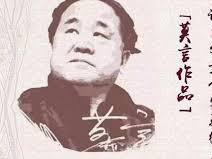 more universalized among Chinese people, Chinese literature is at a perilous time. Only a small fraction of people are willing to take a literary book and read. Most people hide behind their phones, just seeking a short period of enjoyment. Therefore, less and less insightful writers emerge nowadays. Even if there is any, most of them are quite shallow. There is a slight tendency that in-depth authors focus on their high-esteemed purpose, leaving ordinary people to drift along with the mainstream and lost their way in the trivial and short pleasure brought by electronic devices. It’s really nobody’s fault, but young people do need to read more classic books. They were recognized as classics for a reason. We urge anyone who has willing to read more.
more universalized among Chinese people, Chinese literature is at a perilous time. Only a small fraction of people are willing to take a literary book and read. Most people hide behind their phones, just seeking a short period of enjoyment. Therefore, less and less insightful writers emerge nowadays. Even if there is any, most of them are quite shallow. There is a slight tendency that in-depth authors focus on their high-esteemed purpose, leaving ordinary people to drift along with the mainstream and lost their way in the trivial and short pleasure brought by electronic devices. It’s really nobody’s fault, but young people do need to read more classic books. They were recognized as classics for a reason. We urge anyone who has willing to read more.
Related Articles
Chinese Language
Why Do Chinese Love Red Color?
Culture of Face in China
 the Great Learning(大学), Mencius(孟子), and the Analects(论语).
the Great Learning(大学), Mencius(孟子), and the Analects(论语). a book of quotations and dialogues compiled by disciples and next-generation disciples of Confucian to record Confucian's political opinions, theoretical thoughts, moral concepts, and education principles. It's also one of five classics that scholars in later generations must study.
a book of quotations and dialogues compiled by disciples and next-generation disciples of Confucian to record Confucian's political opinions, theoretical thoughts, moral concepts, and education principles. It's also one of five classics that scholars in later generations must study.
 and counsels of the warlords and strategists in the Warring States Period, compiled by Liu Xiang from the Western Han Dynasty.
and counsels of the warlords and strategists in the Warring States Period, compiled by Liu Xiang from the Western Han Dynasty.  Cao Pei (Song of the Yan Country), and Cao Zhi (Ode to the Goddess of the Luo River).
Cao Pei (Song of the Yan Country), and Cao Zhi (Ode to the Goddess of the Luo River).


 work includes Snow in Midsummer, Butterfly Dreaming, The Rescue of a Courtesan, River-viewing Lofty, and many more.
work includes Snow in Midsummer, Butterfly Dreaming, The Rescue of a Courtesan, River-viewing Lofty, and many more.

 Many writers felt oppressed by the old Chinese traditions and customs and the imperialist threats from outside that they wrote a lot of novels to call people up to rebel. There were world-famous writers like Lu Xun (1881 - 1936) who wrote, A Madman's Diary, Call to Arms, Wandering, Life Is a Moment and more, Guo Moruo who wrote Goddess, Wen Yiduo who wrote Candle, Dead Water, Zhu Ziqing wrote Trace, Bing Xin who wrote Stars and Midnight Blue and Spring Water, Yu Dafu who wrote Falling, and many more. Many newspapers were established by scholars who strove to wake Chinese people from their fatuous ideas and embrace the revolution. Among them, Mao Dun, Ba Jin, Lao She, Zhang Tianyi, Qian Zhongshu, Xiao Jun, Xiao Hong, Zang Kejia, Cao Yu, Xia Yan, Ding Ling, He Jingzhi, and Ding Yi were some of the most famous essayists.
Many writers felt oppressed by the old Chinese traditions and customs and the imperialist threats from outside that they wrote a lot of novels to call people up to rebel. There were world-famous writers like Lu Xun (1881 - 1936) who wrote, A Madman's Diary, Call to Arms, Wandering, Life Is a Moment and more, Guo Moruo who wrote Goddess, Wen Yiduo who wrote Candle, Dead Water, Zhu Ziqing wrote Trace, Bing Xin who wrote Stars and Midnight Blue and Spring Water, Yu Dafu who wrote Falling, and many more. Many newspapers were established by scholars who strove to wake Chinese people from their fatuous ideas and embrace the revolution. Among them, Mao Dun, Ba Jin, Lao She, Zhang Tianyi, Qian Zhongshu, Xiao Jun, Xiao Hong, Zang Kejia, Cao Yu, Xia Yan, Ding Ling, He Jingzhi, and Ding Yi were some of the most famous essayists. more universalized among Chinese people, Chinese literature is at a perilous time. Only a small fraction of people are willing to take a literary book and read. Most people hide behind their phones, just seeking a short period of enjoyment. Therefore, less and less insightful writers emerge nowadays. Even if there is any, most of them are quite shallow. There is a slight tendency that in-depth authors focus on their high-esteemed purpose, leaving ordinary people to drift along with the mainstream and lost their way in the trivial and short pleasure brought by electronic devices. It’s really nobody’s fault, but young people do need to read more classic books. They were recognized as classics for a reason. We urge anyone who has willing to read more.
more universalized among Chinese people, Chinese literature is at a perilous time. Only a small fraction of people are willing to take a literary book and read. Most people hide behind their phones, just seeking a short period of enjoyment. Therefore, less and less insightful writers emerge nowadays. Even if there is any, most of them are quite shallow. There is a slight tendency that in-depth authors focus on their high-esteemed purpose, leaving ordinary people to drift along with the mainstream and lost their way in the trivial and short pleasure brought by electronic devices. It’s really nobody’s fault, but young people do need to read more classic books. They were recognized as classics for a reason. We urge anyone who has willing to read more.